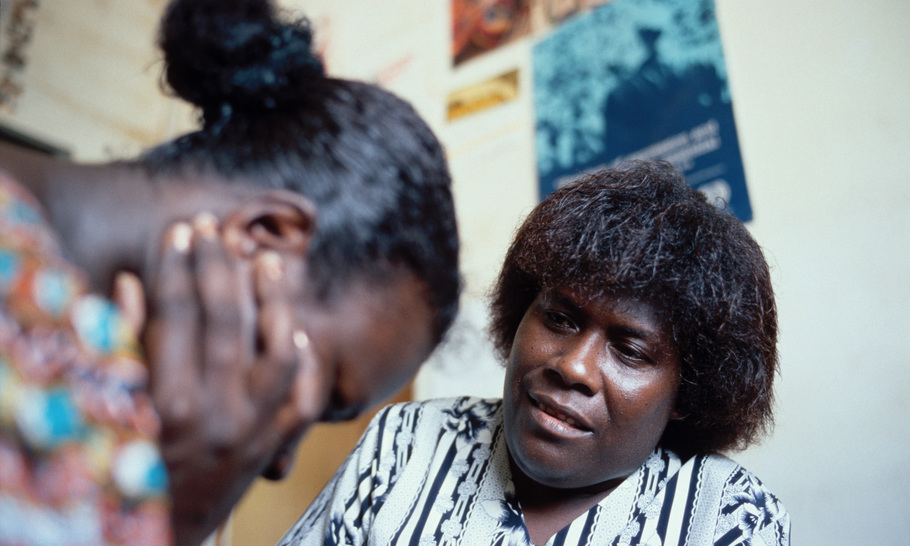Women's Aid Federation is vitally important. It can't afford to forget its feminist roots

PNG counselling service for women. PNG 2008. Photo: AusAID
Women’s Aid Federation, England (WAFE) was one of the very first feminist projects I encountered. Women’s Aid, founded in 1974, was a grass roots organisation, staffed by volunteers and a few full-time paid workers. It ran as a collective, meaning that decisions would be made by consensus, and not imposed by the bosses.
I came across WAFE in 1980 as an 18-year-old. What I saw when I volunteered for a refuge in Leeds was feminism put into action. Women being able to access feminist support when escaping violent men, as opposed to a more generalised approach, allowed countless women finding their voices, and articulate the causes and effects of domestic violence.
When I was contacted recently by a whistle-blower, who told me that footage had been discovered of the current Chief Executive (CE) giving a gushing speech at the 2015 UKIP conference, I realised just how far this particular organisation had departed from its feminist roots. The feminist ethos that has held WAFE together for 45 years is in danger of being replaced by corporate blandness.
Katie Ghose, who has been in post since July 2017, is former CE of the Electoral Reform Society (ERS). During her speech, which, I am told, had not been known about within WAFE until very recently, Ghose praised former UKIP MP Douglas Carswell, and referred to him as an “outstanding MP”. During his time in Parliament, Carswell consistently voted against gay rights, the smoking ban, and marriage between two people of the same sex. On seeing this video, I had a little dig around the internet and discovered even more evidence that Ghose was not only unlikely to be a feminist (not many heap compliments on UKIP MPs) but she had also invited, in her role at the ERS, the grotesquely offensive Katie Hopkins to speak at an event – during which Hopkins joked about gassing a room full of people.
It was clear that the previously feminist edge to WAFE was in decline when they refused to sign a letter condemning the brutal physical attack on Maria McLaughlin at Hyde Park Corner in 2017 by a male trans activist.
Perhaps more shockingly, WAFE declined to join calls from feminist anti-violence against women groups, including failing to respond to a tweet from Harriet Harman MP, to condemn the insultingly light sentence given to John Broadhurst , a multi-millionaire who left his injured and bleeding partner to die after “rough sex”. Imagine that: supposedly the most prominent domestic violence charity failing to condemn a legal defence of beating a woman to death during sex being established?
According to its website , WAFE operates on ’feminist principles’. So why did they appoint a CE with no feminist credentials? And why, if she was an unknown entity within the women’s sector, did nobody on the recruitment panel even Google her?
I have spoken to a number of women currently or previously involved in WAFE who tell me that senior management has become increasingly corporate and aloof. As one refuge manager said, “I think the board and the CE are more concerned with impressing funders and the hoi polloi than supporting the staff that get their hands dirty, protecting women and kids from serious harm. That is what we are supposed to be about.”
Perhaps the description on the recruitment pack of WAFE is that it is an organisation, “which punches well above its weight” is not appropriate for a domestic violence charity, but hey, there is much more to worry about than mere semantics. Take, for example, the Person Specification for the job of CEO. Under ‘desirable’ rather than essential is the “Understanding of the effects and causes of violence against women.” One senior member of staff tells me she is appalled that this key plank of knowledge about male violence is not one of the most essential qualifications for the job.
Karen Ingala-Smith, a proudly feminist CE of the Nia Project, is unhappy with the turn of events, and says that one of the requirements of the appointment to the role of CEO of Women’s Aid is that the post holder should be a feminist.“No feminist could believe that women and girls would be better off with more UKIP MPs, including women subjected to men’s violence,” says Ingala-Smith, “and especially women from BME (black and minority ethnic) backgrounds.”
Jess Phillips MP worked for Black Country Women’s Aid for seven years prior to entering Parliament and is currently the chair of the All Party Parliamentary Group on Domestic Violence. In her view, Women’s Aid always has been and always should be a feminist organisation, with the liberation of women at its core. “The organisations principles, reputation and above all else, its services, is bigger than any one person,” says Phillips, “and that feminist collective must always be protected.”
In the meantime, the Tories are closing down women’s refuges, and the men’s rights movement is busy claiming that domestic violence is a myth. On average, one woman every three days dies as a result of domestic violence across England and Wales. Which makes it all the more tragic that a key organisation charged with the hellish task of maintaining the little protection available to vulnerable women and their children appears to have lost its feminist principles.





